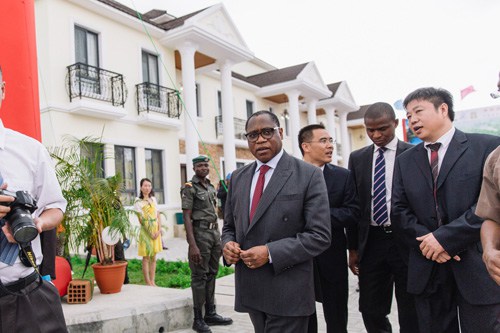|
 |
|
TALKING BUSINESS: Staff from the Chinese Civil Engineering Construction Corp. Nig. Ltd. show a real estate project to Nigerian officials in Lagos on November 16, 2013 (ZHANG WEIYI) |
Making a difference
Changes brought by Chinese companies in Africa are having a positive effect on locals. "It [Huawei] provides innovative solutions to millions of Nigerians. Its partnership with all operators in Nigeria and government agencies improves communication systems and provides managed services in my country," said Funso Adebayo, a local Huawei employee.
Olusegun Obasanjo, former President of Nigeria, was amazed to learn that Huawei is a privately owned Chinese company. "The company has made extraordinary contributions to the establishment of the communication network of Nigeria," he said.
Besides ICT companies like Huawei, Chinese construction companies are building roads, railways and bridges to fill the transportation gap in many African countries. In Kenya, a $13.8-billion railway project that will run from the busy port city of Mombasa to the capital Nairobi is underway. Construction began on November 28, 2013, and the CRBC expects to complete the project by 2017, which will dramatically increase trade, boosting Kenya's position as a regional economic powerhouse. The rail line will extend to Uganda and then potentially connect with proposed lines to Rwanda and South Sudan.
"It will most definitely transform the course of development not just for Kenya, but the whole region in East Africa," President Uhuru Kenyatta said at the ground-breaking ceremony for the project, adding that East Africa will become a competitive investment destination because of the project.
With the new lines, train trips will be cut from 12 hours to around four. Rail transport is of particular importance because many regional roads are in a poor state of repair and also suffer from congestion.
Localizing business
Local employees play a vital role in building these projects. Years of experience in Africa have informed Chinese companies that localization is the only way to achieve sustainable development. "Most Chinese staff are young and will only work in Africa for three to five years, 10 at the most, as they have family in their motherland." Li said, "Locals are permanent, and as long as the jobs can be done by locals, we will employ them." Nearly 95 percent of the company's employees are locals, with some working there as long as 27 years.
With unemployment rates increasing in many African regions, threatening social stability, the trend of hiring local staff at foreign-invested companies is welcome relief.
As Chinese companies based in Africa become more established, they are capable of localizing their business to employ and train more locals. "Directors of Chinese enterprises eyeing overseas markets have realized the importance of adapting to local situations. They are capable of and willing to shoulder more responsibilities," said Liu Guangyuan, China's Ambassador to Kenya.
About 65 percent of the 4,000 employees of Huawei's projects in Africa are recruited locally and about 10, 000 jobs are created indirectly by the company, said Gao.
An urban railway project in Abuja, Nigeria, launched on July 23, 2013, employs more than 2,000 locals, with only 80 Chinese staff. CCECC, the company spearheading the project, estimates that when the project is completed, more than 3,000 locals will have been recruited to operate and maintain the railway.
It is estimated that CCECC's registered local employees in Nigeria had reached 10,500 by the end of 2012, including management and technical positions.
To help local staff master the necessary skills and train local ICT professionals, Huawei took the lead in establishing a training center in Abuja, Nigeria in 2006, where its workers can receive systematic ICT training. "The center can accommodate more than 2,000 trainees annually," said Gao.
Funso Adebayo, a Nigerian worker at Huawei, benefits from the company's vocational training platform. "Huawei standardizes our procedures according to industry standards and develops staff on the job through training," he said.
In addition, some are sent to China to study R&D. "The training makes it possible for local employees to become qualified experts both in technology and management," said Gao.
CCECC's training center in the IDU Industrial Park has become an incubator for senior management staff, mechanical technicians and operators. The center trains about 100 locals every month.
"Working in a Chinese company helps me discover myself and realize my self-improvement. With the skills learned and the experience gained here, I have become more confident," said Aweda.
| 